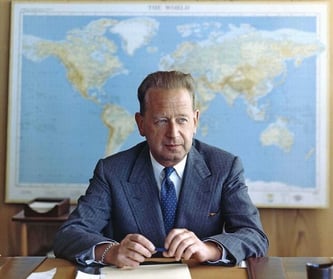 Dag Hammarskjöld
Dag Hammarskjöld
I recently read a brief reflection on the life of Dag Hammarskjöld, one of the twentieth century’s truly outstanding international statesmen. As Secretary General of the United Nations following the Second World War, Hammarskjöld commanded the world stage at a time when the healing of nations was the critical task.
Yet for all the power of his office, Hammarskjöld was a startlingly humble man. His private reflections on his public life, published under the title “Markings” after his tragic death at age 56, reveal a man of faith who understood that he was first of all a servant of God at work as a preeminent public servant.
Robert Ellsberg, in his book titled “All Saints: Daily Reflections on Saints, Prophets, and Witnesses for Our Time,” observes that the only note Hammarskjöld made of his election to the position of Secretary General was one humble phrase: “Not I, but God in me.” Hammarskjöld lived a quite celibate life fully available to God’s purposes in restoring the torn fabric of humanity. “He was an example,” Ellsberg notes, “of that rare person for whom public service is not simply a career or a means to power, but a religious vocation, a way of being faithful to God.”
You and I will never be a Dag Hammarskjöld. The fate or future of nations will never be in our hands. We are lucky (or more accurately, anointed) to reveal and cultivate God’s goodness in those little pockets of life entrusted to our care. Yet your life and mine, lived on the stage perfectly suited to our gifting in God’s holy plan, indeed are “a religious vocation, a way of being faithful to God.”
This phrase, “a way of being faithful to God,” reveals the essential starting point of our response to God’s calling. It is an ongoing starting point, continually offered fresh across our lifetime in response to God’s continual invitation.
And what is this invitation? It is the ongoing invitation to enter ever more deeply into God by entering ever more deeply into the life which is uniquely yours. Every stage of life, every circumstance, every success and every failure, every gain and every letting go—in short, the whole of your life in all of its many dimensions—affords you multiple entry points into God’s calling.
In my work with men and women regarding spiritual growth and vocational discernment I encounter lives humbly lived far from the circles of power. Yet remarkably I find in them a consistent commitment to endure, to be faithful to God, even when the clear vocational path becomes obscured.
I think of one woman, vitally alive and happily married for forty years, whose spouse has been diagnosed with dementia. Even in her deep grieving for her husband and her marriage she remains faithful to God as her life is being unexpectedly reshaped. I think of an “empty nester” whose children no longer need her the way they needed her before. Rather than dream of the day when she can repeat the motherhood cycle with grandchildren, she is acknowledging that God’s invitation is far more immediate: entry into her own personhood.
I think, too, of a man, whose decades-rich industry expertise is no longer needed, and who finds himself—and his knowledge—replaced by a younger generation fresh out of school. “The glory of God is the man, the woman, fully alive,” he confided recently, “and I don’t know how to be that right now. The platform that has supported my life has been taken away, and I wonder what God is up to.”
That’s the humbling vocational piece: Wondering what God is up to, now that everything looks different, now that the familiar platform has been taken away. To quote Dag Hammarskjöld, “The best and most wonderful thing that can happen to you in this life is that you should be silent and let God work and speak.”
Copyright 2012 Mary Sharon Moore, M.T.S.
About the Author

Guest
We welcome guest contributors who graciously volunteer their writing for our readers. Please support our guest writers by visiting their sites, purchasing their work, and leaving comments to thank them for sharing their gifts here on CatholicMom.com. To inquire about serving as a guest contributor, contact editor@CatholicMom.com.


.png?width=1806&height=731&name=CatholicMom_hcfm_logo1_pos_871c_2728c%20(002).png)
Comments